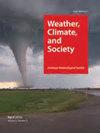Climate Change and Homicide: Global Analysis of the Moderating Role of Information and Communication Technology
IF 1.9
4区 地球科学
Q3 ENVIRONMENTAL STUDIES
引用次数: 1
Abstract
The link between climate change and human conflict has received substantial attention in academic research using different measures of “conflict”; however, it is yet to interpret interpersonal violence in terms of homicide. This study takes a global perspective to investigate how climate change, typically represented by temperature and precipitation, directly and indirectly affects national homicide rates across countries. From longitudinal archival data from 171 countries from 2000 to 2018, we detect a direct and positive relationship between higher temperatures and homicide, whereas an indirect pathway between wetter climate and homicide through the occurrence of more natural hazards has also been shown in our empirical results. The relationship between climate change and homicide can be moderated by the level of information and communication technologies (ICT). We conclude that the development of ICT contributes to building the countries’ resilience to climate change with better information and communication technologies to help alleviate the negative impacts of climate change on homicide.气候变化与杀人:信息和通信技术调节作用的全球分析
气候变化与人类冲突之间的联系在使用不同“冲突”衡量标准的学术研究中受到了极大关注;然而,它还没有从杀人的角度来解释人际暴力。这项研究从全球角度调查了以温度和降水为代表的气候变化如何直接和间接影响各国的国家谋杀率。从2000年至2018年171个国家的纵向档案数据中,我们发现高温与凶杀之间存在直接和积极的关系,而我们的经验结果也表明,气候潮湿与凶杀之间通过发生更多自然灾害而存在间接途径。气候变化与凶杀之间的关系可以通过信息和通信技术的水平来调节。我们的结论是,信息和通信技术的发展有助于建立各国应对气候变化的能力,提供更好的信息和通讯技术,帮助减轻气候变化对凶杀案的负面影响。
本文章由计算机程序翻译,如有差异,请以英文原文为准。
求助全文
约1分钟内获得全文
求助全文
来源期刊

Weather Climate and Society
METEOROLOGY & ATMOSPHERIC SCIENCES-
CiteScore
3.40
自引率
13.60%
发文量
95
审稿时长
>12 weeks
期刊介绍:
Weather, Climate, and Society (WCAS) publishes research that encompasses economics, policy analysis, political science, history, and institutional, social, and behavioral scholarship relating to weather and climate, including climate change. Contributions must include original social science research, evidence-based analysis, and relevance to the interactions of weather and climate with society.
 求助内容:
求助内容: 应助结果提醒方式:
应助结果提醒方式:


